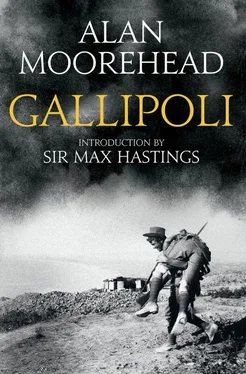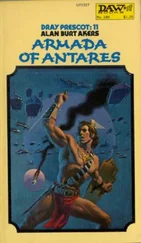There was a curious atmosphere at the conference that gathered in de Robeck’s stateroom on May 9. All the admirals — even de Robeck — were now eager to try again and they more than half believed that they would get through. They accepted the fact that there might be heavy losses, and that half the Fleet might find itself stranded in the Sea of Marmara; nevertheless they wanted to go. De Robeck still hung back somewhat — he said he did not think that the mere appearance of the battleships in the Marmara would necessarily force Liman von Sanders to retire or Constantinople to surrender — but he agreed to put the proposal to the Admiralty. The message that was sent was not a very enthusiastic document; it said in effect, ‘We are quite ready to attack again but if we fail the consequences will be ruinous.’ Yet when the admirals rose from the conference they fully expected that the Admiralty in London would decide to take the risk and order them to go ahead.
Admiral Guépratte was all for it. He had not been summoned to the conference, but, says Keyes, ‘I knew he was of the same mind as I was, and ardently longed to renew the naval offensive; in fact, when I told him my hopes, he said, “Ah, Commodore, that would be immortalité .” He was elated, and at once telegraphed to the Minister of Marine as follows: “ A fin d’assister l’Armée dans son action énergique et rude, nous méditons vive action flotte dans détroit avec attaque des forts. Dans ces conditions il me faut mes cuirassés Suffren, Charlemagne, Gaulois dans le plus bref délai possible .” ’
These messages now set the whole issue of the Gallipoli campaign ablaze in London.
On the morning of May 11 Churchill and Fisher met at the Admiralty to discuss de Robeck’s telegram, and Fisher at once made himself clear: he would have no part of any new attempt on the Narrows. Churchill’s position was more complicated. Italy was about to enter the war, and as part of her price for joining the Allies she asked that four British battleships and four cruisers should be placed under her command in the central Mediterranean. Churchill himself had been over to the Continent early in May to conduct the negotiations, and thinking at that time that de Robeck had abandoned all idea of forcing the Dardanelles, he agreed that Italy should have the ships. They were to be taken from the Dardanelles. There was, too, another issue, and it was very urgent: news had been received at the Admiralty that German submarines had reached the Mediterranean and were on their way to the Ægean. De Robeck’s fleet and the precious Queen Elizabeth were stationed in the open sea, and it did not seem practicable for him to undertake a new offensive with this new peril in his wake.
Churchill, however, was in favour of at least a limited advance; he wanted the minefields in the lower straits swept up so that the Fleet would be in a position to go through the Narrows once the Army had won the peninsula. Fisher’s answer to this was that he was opposed to any action whatsoever until the Turkish Army was defeated.
The two men were in the midst of this discussion — perhaps argument is the better word, for they were now drifting steadily apart in their ideas — when news reached them that the battleship Goliath had been sunk in the Dardanelles. It was a brilliant manœuvre on the part of the enemy. In the very early hours of May 12 a Turkish destroyer commanded by a German lieutenant had emerged from the straits and had crept up upon the battleship at her anchorage about 100 yards offshore in Morto Bay. The quartermaster aboard the Goliath hailed the strange vessel through the darkness, and when he got a reply in English no alarm was given. An instant later three torpedoes struck, and the battleship heeled over and sank in two minutes. Although the French soldiers on the coast could plainly hear the cries of the crew as they struggled in the water, more than 500 men were drowned. The Turkish destroyer dashed away up the straits proclaiming her success over her radio.
The Goliath was not an important ship — she was fifteen years old and her tonnage was less than 13,000—yet the very fact that she had been sunk and in such difficult circumstances made the presence of the U-boats seem more menacing than ever. Fisher announced that he must retire the Queen Elizabeth from the Mediterranean at once. Churchill was ready to agree to this: new monitors with anti-torpedo blisters on their sides were ready to sail, and there were other replacements which could be sent to de Robeck. But it was a very different matter with Lord Kitchener. On May 13 Churchill asked him to come to a conference at the Admiralty, and it was there that he was given the news of the withdrawal of the flagship. ‘Lord Kitchener,’ Churchill relates, ‘became extremely angry… Lord Fisher flew into an even greater fury. “The Queen Elizabeth would come home; she would come home at once; she would come home that night or he would walk out of the Admiralty then and there.” ’ Churchill did his best to mollify Kitchener by telling him of the new monitors and the other replacements, and at the breaking up of the meeting Fisher had his way. Orders were sent out recalling the Queen Elizabeth , and at the same time de Robeck was forbidden to renew his attack on the Narrows.
The meeting of the War Council on the following day, May 14, is described by Churchill as ‘sulphurous’. Of all the men who gathered at 10 Downing Street that day only Churchill and Lord Hankey, who was the secretary of the Council, survive. Yet the scene has the contemporary quality which seems to characterize all the crises of the Gallipoli expedition.
Kitchener was very bitter. He had sent an army to Turkey, he said, because he had been assured that the Navy would force the Dardanelles, and because he had been led on by Churchill insisting upon ‘the marvellous potentialities of the Queen Elizabeth ’. The Navy had failed, and now the Queen Elizabeth was being taken away at the very moment when the Army was struggling for its life on the edge of the peninsula. It so happened that The Times on this day had come out with its attack upon Asquith’s Government over the shortage of the supply of shells. As he went on to deal with this matter, Kitchener became increasingly gloomy. No organization, he said, could keep pace with the expenditure of ammunition. No one could foresee what would happen. If the Russians cracked in the East it was quite possible that the Germans would bring back their armies to the West and set out upon the invasion of England.
Fisher’s only comment on all this was that he had been against the Dardanelles adventure since the beginning, and this, he said, Lord Kitchener knew perfectly well. Everyone now seems to have been in an angry and despondent mood, and they listened without much patience as Churchill argued that the success of the campaign had never depended upon the Queen Elizabeth. The only thing to do now, he said, was to reinforce Hamilton, push the campaign through to a conclusion and forget their vague fears about the invasion of England. But with his First Sea Lord openly antagonistic to him Churchill was not in a strong position, and the meeting broke up without any decision being reached.
The crisis now moved quietly, almost stealthily, to its climax. In the afternoon there was a quite amicable meeting between Fisher and Churchill on the subject of the replacements that were to be sent to de Robeck. The list of ships was agreed, and Fisher went off to bed. Late that night Churchill went through the list again and decided to add two E-class submarines to it. His minute on the subject was sent off in the usual way to Fisher’s office, so that the Admiral would see it on his desk when he arrived first thing on the following morning. Upon this the explosion erupted. Fisher appears to have reached his office about 5 a.m. on May 15, and on seeing Churchill’s minute immediately decided to resign. The two submarines were, apparently, the last straw. ‘First Lord,’ he wrote, ‘After further anxious reflection I have come to the regretted conclusion I am unable to remain any longer as your colleague. It is undesirable in the public interests to go into details — Jowett said “never explain”—but I find it increasingly difficult to adjust myself to the increasing daily requirements of the Dardanelles to meet your views — as you truly said yesterday I am in the position of continually veto-ing your proposals.
Читать дальше












